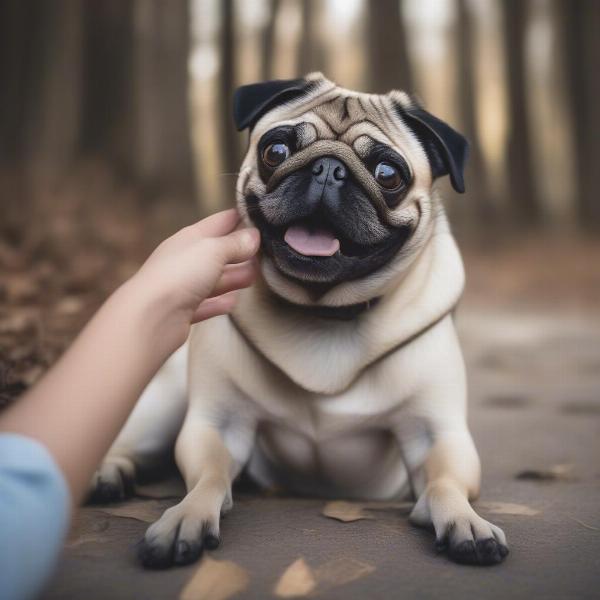Pugs, with their wrinkled faces and curled tails, have captured the hearts of many. But are pugs aggressive dogs? This is a common question among prospective and current pug owners. The truth is, aggression in pugs is more nuanced than a simple yes or no. While pugs aren’t inherently aggressive, certain factors can influence their behavior. Let’s delve into the world of pug personalities and understand what might trigger unwanted behaviors.
Understanding Pug Temperament: Are They Naturally Aggressive?
Pugs were originally bred as companion dogs, and their history reflects this. They thrive on human interaction and are generally known for their playful and affectionate nature. So, the notion of pugs being inherently aggressive is largely a misconception. However, like any dog breed, individual pugs can display aggressive tendencies due to a variety of factors, including poor socialization, fear, or underlying health issues.
 Pug playing with its owner
Pug playing with its owner
Factors Influencing Pug Aggression
While pugs are generally gentle, certain circumstances can lead to aggressive behaviors. One crucial factor is early socialization. Puppies exposed to a variety of people, animals, and environments are less likely to develop fear-based aggression later in life. Conversely, pugs lacking proper socialization may become anxious or defensive in unfamiliar situations, leading to aggression.
Another contributing factor is fear. If a pug feels threatened or cornered, it might resort to aggression as a defense mechanism. This is particularly true for pugs that haven’t been properly socialized.
Health and Aggression in Pugs
Sometimes, underlying health issues can contribute to aggressive behavior in pugs. Pain or discomfort can make a pug irritable and more prone to snapping or biting. If your normally sweet pug suddenly becomes aggressive, it’s essential to consult a veterinarian to rule out any medical causes.
How to Manage and Prevent Aggression in Pugs
Proper training and socialization are key to preventing aggression in pugs. Positive reinforcement methods, such as rewarding good behavior with treats and praise, are particularly effective. Consistency is crucial. Establishing clear boundaries and rules will help your pug understand what’s expected of them.
Dealing with an Aggressive Pug
If your pug displays aggressive behavior, it’s crucial to seek professional help from a certified dog trainer or behaviorist. They can assess the situation and develop a tailored behavior modification plan. Never punish your pug physically, as this can worsen aggression.
Conclusion: Pugs – Loving Companions with Proper Care
So, are pugs aggressive dogs? The answer is generally no. Pugs are affectionate companions who thrive on human interaction. However, like any breed, they can exhibit aggressive behaviors under certain circumstances. By understanding the factors that can contribute to aggression and implementing proper training and socialization, you can ensure your pug remains a loving and well-adjusted member of your family.
FAQ
-
Are pugs naturally aggressive towards other dogs? Not usually. Pugs are generally friendly towards other dogs, especially with proper socialization.
-
Can pugs be aggressive towards children? While pugs are usually good with children, it’s important to supervise their interactions, especially with very young children.
-
How can I tell if my pug is feeling aggressive? Signs of aggression in pugs can include growling, snarling, snapping, or biting.
-
What should I do if my pug bites someone? Seek immediate veterinary attention for the injured person and consult with a certified dog trainer or behaviorist to address your pug’s behavior.
-
Is it too late to socialize an adult pug? While it’s easier to socialize a puppy, it’s still possible to socialize an adult pug with patience and consistency.
ILM Dog is your go-to resource for comprehensive and reliable information on dog care and breeding. We cover everything from breed selection and health care to training and nutrition. Our expert advice caters to both new and experienced dog owners worldwide. Contact us today for expert advice! Email: [email protected]. Phone: +44 20-3965-8624. Visit ILM Dog for more insightful articles and tips on all aspects of dog care.